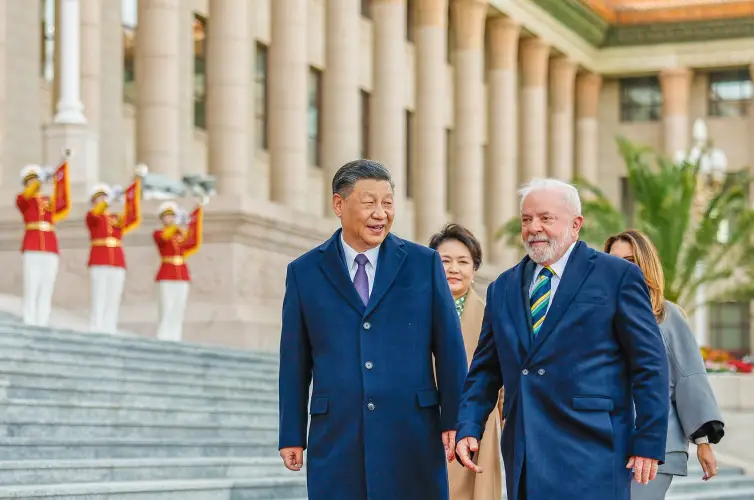As President Xi Jinping arrives in Brazil for the G20 Leaders’ Summit, there is a renewed focus on the growing relationship between the two nations. This visit highlights the importance of China-Brazil ties, not only in trade and investment but also in the broader spectrum of international relations, where climate change is becoming a central issue.
Since the 1990s, Brazilian presidents have seen China as a key partner, particularly in trade. Now, under President Lula da Silva’s administration, this relationship has been revitalized with a stronger strategic dimension. In their April 2023 meeting, President Lula and President Xi placed climate change at the forefront of their discussions, underscoring its significance in Brazil-China bilateral relations.
Both China and Brazil are major emitters of greenhouse gases, even though their per capita emissions differ. While China is a leader in energy transition policies, Brazil’s emissions are largely tied to deforestation and land-use changes. With nearly 60% of the Amazon rainforest within its borders, Brazil’s role in the global fight against deforestation is crucial. Given Brazil’s prominence in the global meat and grain trade, the country could also play a vital role in the shift towards low-carbon agriculture models.
Placing Climate at the Center of Brazil-China Relations
This op-ed argues that Brazil and China must place the climate emergency at the heart of their renewed partnership. A key focus should be on addressing deforestation as an urgent priority, especially given its implications for both countries’ development and security. For instance, the two countries’ coastal zones concentrate important parts of their respective population and key economic activities; and changing weather patterns are already impacting agricultural cycles in Brazil threatening food productions. During the recent UN Summit for the Future, the international community acknowledged the links between climate change and global peace and security, emphasizing the need for cooperative solutions.
Brazil faces a significant challenge in responding to the climate emergency, especially as it attempts to balance economic growth with social justice and environmental sustainability. With over half of Brazil’s emissions tied to land-use changes, the country’s dependence on agribusiness, particularly soybean cultivation and beef production, has made deforestation a central issue. The expansion of these industries, in part driven by global demand, particularly from China, has led to unsustainable agricultural practices and rising deforestation rates in Brazil.
China’s role in Brazil’s agribusiness cannot be understated. China has become Brazil’s largest trading partner, accounting for 33.4% of Brazil’s agribusiness exports in 2022, with soybeans, meat, and forestry products dominating the bilateral trade. This growing demand has fuelled Brazil’s agricultural expansion, but it has also contributed to environmental degradation.
Breaking the Economic-Environmental Dilemma
For Brazil and China to truly align their development goals with climate objectives, they must break the false dichotomy between economic growth and environmental protection. Both nations need to collaborate on a broader, cohesive vision of sustainable development that is socially inclusive and economically prudent. Addressing deforestation should be at the top of their agenda. Research shows that agribusiness and food production are critical factors in preventing catastrophic global warming. This is particularly relevant to Brazil and China’s bilateral relations, where agriculture plays such a pivotal role.
Brazil and China have already made commitments to ’eliminate illegal logging and deforestation’, but they have yet to fully integrate this into their bilateral agenda. The subcommittee on environment and climate set up in 2023 under the framework of the China-Brazil High-Level Coordination and Cooperation Committee (COSBAN), is yet to include deforestation into its discussion.
Seizing the Diplomatic Moment to Centre Forest
Both countries must seize this diplomatic moment to integrate climate-related goals into their strategic partnership. Brazil and China should work together, both diplomatically and through other channels, to address deforestation and promote sustainable agricultural practices. At a recent workshop in São Paulo, Chinese and Brazilian stakeholders discussed the impact of climate change on soybean production. Kevin Chen, the director of China’s International Center for Agricultural and Rural Development, stressed that climate change is already affecting Brazil’s agricultural output. He called for an end to deforestation driven by soybean and beef production, while maintaining livelihoods and production levels.
This shift in rhetoric from China, which traditionally avoids interfering in other nations’ domestic policies, may signal a new phase in China-Brazil relations. Brazil’s agribusiness sector, too, will need to adapt to these emerging sustainability trends to continue meeting China’s demand for commodities. Other demands may also come from the European Union, another key partner in Brazil’s trade relations.
Brazil and China must champion solutions to the climate emergency that respect their right to sustainable development. By integrating the climate agenda into their strategic partnership, Brazil and China can usher in a new phase of bilateral relations. In a world where climate change demands urgent transitions, from energy to agriculture, both countries have an opportunity to play a leading role in shaping a more sustainable and inclusive global future.
As China continues to rise as a global superpower, Brazil must navigate its own development path in a way that aligns with the constraints of the Anthropocene. Together, they should pave the way for a future where economic growth and environmental stewardship are not opposing forces, but complementary goals.













